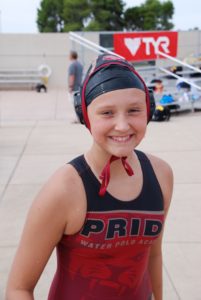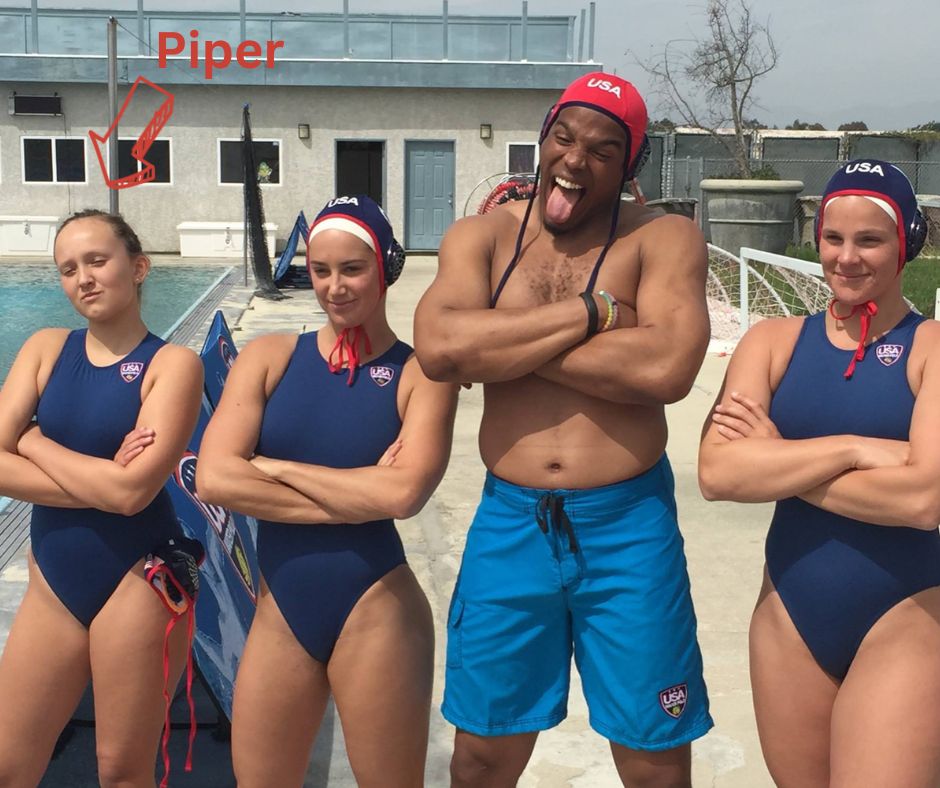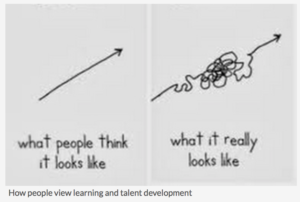
My Daughter Quit Sports, and This Is What Youth Sports Parents Need To Know
By Ilovetowatchyouplay founder Asia Mape
My daughter quit sports, and this is what youth sports parents need to know. This is my oldest daughter, Piper, and yes, I got her permission to write this. She’s a water polo player. Well – she used to be. She dreamed of playing for the Olympic team, went to water polo summer camps, made the Olympic Development team, and spent a week at the Olympic training camp in Colorado; she even filmed a TV show with Cam Newton about her dream of playing in the Olympics. She said she wanted to play in college. She chose her high school based on her water polo coach. She played for eight years. Piper quit sports right before her senior season of high school.
A sports parents’ nightmare
How did this fearless water baby who fell in love with the sport go from wanting to dedicate her life to it, to feeling overwhelming anxiety from it and not wanting to play at all? As a youth sports parent, is this your worst nightmare? Your child and your family sacrifice hundreds of hours and thousands of dollars, you are carpool mom extraordinaire, you make special game day muffins, many of your friends are the parents from the team, and you have already made a college recruiting video. You are so invested; in fact, you’re on the board of the club team. This is me. And then, poof, one day, they quit. It’s gone in a flash. And you’re left wondering what it was all for, where we did go wrong, and why didn’t I do something about her unhappiness sooner.
Even the best-intentioned parents don’t always get it right
These are questions I think about. The answers are complex and layered with guesswork and a lot of guilt. But what I do know is that I learned A LOT about what works and what doesn’t and how even the best-intentioned parents can lose focus on what truly matters: their child’s happiness. My hope is that by sharing this, others might learn from my mistakes and get it right, or at least more right. There are so many things that go into a decision to quit that are unique and personal to the athlete, including, for mine, COVID-19, a health scare, and her passion for art. Piper quitting has undeniably been the best thing for her and for our relationship. She is happier and doing what she is meant to do, creating incredible art and attending art school, and I have continued to support her wholeheartedly on this journey. However, several issues surfaced when she was still playing water polo that drastically affected her desire to continue to play, so I wrote this article to help all of us youth sports parents still in the trenches.
Here are the top 5 things sports parents need to know:
When Quitting Sports Is The Right Thing To Do
#1: We didn’t listen
The day Piper let her coach know she wasn’t coming back didn’t happen suddenly; she had been trying to tell us she was unhappy for several years. I just didn’t listen. I didn’t make enough changes to help her stay in love with the game, or at the very least, in like with it.
They are usually telling us, even if they don’t know how to say it directly. Piper was telling us since childhood that sports weren’t going to be her thing “Mom, I’m going to be an actor, not an athlete.” She said this at 5 when I was cajoling her to go to the basketball courts to practice with me. I pushed that memory down deep and tried to pass it off as just one of the many funny things she said. Since her father and I both played D1 sports in college and worked in sports, I don’t think she ever really felt she had a choice. Sports were all she knew. It was our life, so it was hers. But she did drop clues, and I ignored them. I didn’t give her space or opportunities to talk openly about it. When she would try – I would get angry and defensive. I thought she was unmotivated or lazy. I had an agenda and didn’t give her enough encouragement about her own dreams and passions early on.
We have to listen to our kids, even if they can’t say it directly, and oftentimes, they can’t. They know how important it is to us, so they may have a hard time being direct. Don’t ignore their subtle and not-so-subtle hints. Have open discussions and listen without getting defensive or upset, and constantly help them re-assess their goals and then align with THEIR needs and wants instead of pushing your agenda.
Cold, Dry, Hands: The Short Bench
#2 Don’t treat them like mini-adults
It’s called the professionalization of youth sports. When my kids were little, I treated them like they were mini-adults training to be Olympians. I knew how to help them get better; I just didn’t know how to create an environment for a lifelong love of a sport. It’s no wonder my kids didn’t end up playing my sport, basketball. When we would go out to play, I’d correct their form and get frustrated if they were running around and not listening. They called me ‘the fun sucker.’ I treated them like they had similar motivations as I did. I’m a self-help junkie. I want to be better and improve all the time. They didn’t. They were kids. They wanted to have fun and laugh and run around and play a little basketball.
To all you parents out there at the park doing privates with your 7-year-olds, videotaping them, watching them every second at practice. STOP. No judgment here; I was the same. Save your money and your time, and keep it fun and light. If, at 13, they still love it, then go all in. You are slowly taking all the ‘fun,’ creativity, and ownership out of it for them. Instead of doing a private, play with them at the park and laugh and giggle and keep it light. They are getting plenty of serious hours in at their practices.
#3 Support VS. pressure
Crossing the line from supporting to pressuring our kids can be very fine, but when you do it, it’s just as impactful as the most aggressive, over-the-top parent out there. Once you cross over, it’s incredibly hard to come back and repair the damage, but you must try. Because if your child deems that your interest and influence go beyond their happiness and well-being, well – you’ve already lost them. It may not show itself at 7, 10, 16, or even 20, but eventually, it will. And it’s not just quitting or a strained relationship between the child and parent that can occur; it can be subtle, like a slow and steady loss of joy and ownership, that eventually leads to quitting or resentment. Both of which we dealt with.
The most important way parents can support their athletes is to do just that: support. Support looks like love, hugs, excitement, a happy face in the crowd, and a welcoming car ride home – regardless of the outcome on the field. It doesn’t look like expecting a return on investment for the time and money spent, it doesn’t place sports above family and school, and it definitely doesn’t look like a steady dose of anger and disappointment. I struggled with this and still do. Don’t beat yourself up if you’re not perfect yet, but put in the work. Be mindful, and be aware when you are crossing the line. You must trust their process…THEIR process, not your agenda or dreams. Be there to catch them when they fall and congratulate them when they succeed.
What It Takes To Raise Successful Athletes
#4 It’s a marathon, not a sprint
I’m not saying don’t try and motivate them or encourage them when they need a little push. But, allow them space, space to make their own choices, to miss practices, miss a tournament, miss a club season. Water polo is one of the most demanding sports. You train five or six days a week for 2 to 3 hours a day in high school and go right into club season, and sometimes you even do Swim Team at the same time. There is typically one short break for a few weeks in August, and that’s it. These kids are grinding. I should have allowed Piper to take off-seasons – club or fall or anything. Sometimes, it’s good to miss it or just take a breather and do other things. I know many kids who took time away from their sports and came back renewed and reinvigorated and even better players because of it.
You have to look at the entire arc of a youth athlete and not get caught up in what’s happening RIGHT NOW. This is hard to do. And I think this diagram helps explain it so well.
It shows the path of a youth athlete’s development. It is not straight; there are going to be bumps and turns and twists and going two steps backward and then one step forward, and if you don’t allow for this and you focus too much on the short term, the end result will not be good, I promise you. Youth sports should be all about the journey, not the end result. Sports parents have a huge FOMO – A fear of missing out. It’s all coming from fear, fear that your kid is going to be left behind if they miss one camp, one game, or one practice. And the truth is, yes, there could be immediate consequences, but it doesn’t matter. It’s all about the long-term play. And the kid who is doing every camp and every training is probably going to burn out or injure themselves right around the time your kid is peaking – if you allow them time off when they need it.
Try not to get caught up in the rat race. Let this question guide your every decision. IS THIS WHAT’S BEST FOR THE HEALTH, HAPPINESS, AND WELL-BEING OF MY CHILD? If you answer it honestly, you can’t go wrong.
5. Stop nagging them about ‘effort.’
We were constantly on Piper about EFFORT. One of my darkest days as a sports parent was sitting in the car in between games and berating her about her effort and suggesting she might want to quit if she cared so little. I’m ashamed of this deeply and wish so often I could take that day back and others like it. The topic of effort was a constant strain in our home; as we all know, it’s one of the few things an athlete can control, or at least that’s what we’ve all been told. But can they always? Or consistently? How many of you work out? You go for a run, you go to the gym or do the Peloton. And I have to imagine each day you have a different focus, different energy; sometimes you’re crushing it, and sometimes you’re just not. You simply have no gas in your tank. It can be because of what you ate, your stress levels at work, your emotional output that day from an argument with your husband or wife, or how much you slept. So many external factors affect your workout. Now add on top of that: you’re 13, and your brain hasn’t fully developed, or you’re going through puberty, and your hormones are raging. NOW. Imagine you’re watching your child play, and they are having a bad game. They aren’t getting up and down the field well, they can’t seem to get a shot off, or mentally, they just seem out of it, or even worse, their EFFORT seems low. And so, how do we respond? I know for Piper, I didn’t respond well. Call them up, inspire them, and motivate them; don’t call them out. Or don’t say anything at all unless THEY want to discuss it. J.P. Nerbun, an author and coaches consultant, wrote a book, “Calling Up” and if you struggle in this area, I highly recommend it.

I recently asked Piper if she regretted all of the time she spent playing sports as she is now an artist with dreams of directing her own animated series on television. I wondered if she felt it was a waste of her time. She thought about this and acknowledged that she was unhappy for quite a while before we ‘allowed’ her to quit. But then said, and I quote, “I’m glad I did it. I think I learned a lot about myself, and I know when those other artists get tired and give up, I know I am tough and can outlast them.” Waterpolo definitely gave her grit.
We’ll never know how far Piper could have gone with her water polo or how much it set her back with her art. But I do believe the intangibles an athlete gets from playing sports is a gift that is hard to get anywhere else in life. I still can get a little choked up when I see an old Facebook memory pop up from a tournament or important game, but overall, Piper’s quitting has been positive. Our relationship improved, and most importantly, she is happier and less stressed. As one reader shared, “I like to call it retiring, not quitting. Everyone reaches that decision at some point.” Another parent wrote, “When Tom Brady finally retires, we aren’t going to say he is quitting football. Our kids don’t need to feel guilty for making that decision. It’s not quitting; it’s finding another interest.”
More Articles That Might Interest You:
What No One Tells You About Being a Sports Parent
A Father’s Ode To His Son’s Last Game
Nine Signs Your Child Has Burnout
The Reasons Girls Should Play Sports
About The Author














